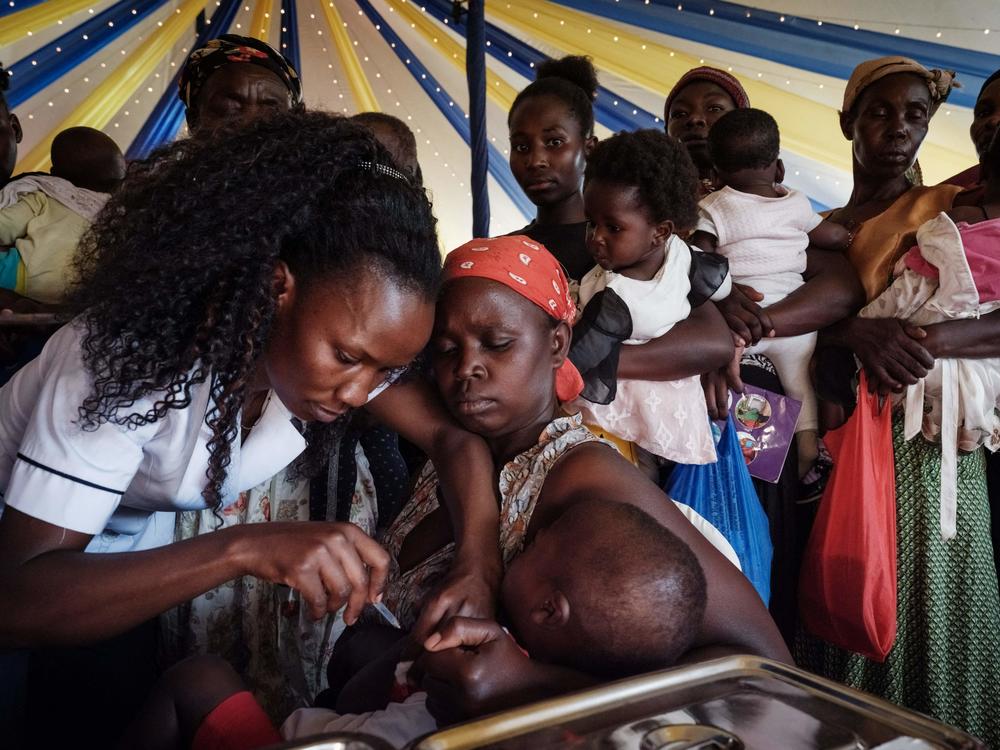Section Branding
Header Content
A 'dream' come true: Now there are 2 vaccines to slash the frightful toll of malaria
Primary Content
"As a malaria researcher," says WHO Director-General Tedros Adhanom Ghebreyesus, "I used to dream of the day when we would have a safe and effective vaccine against malaria. Now we have two."
They're the first vaccines designed to work against a human parasite.
The first, called RTS,S, was unveiled almost two years ago. The second one, recommended by the World Health Organization this week, is called R21/Matrix-M and is intended for children between 5 and 36 months, who are among the most vulnerable to the disease.
"A vaccine recruits the human immune system to fight the parasite as soon as it enters the body," says Dyann Wirth, chair of the WHO Malaria Policy Advisory Group. "A vaccinated person is poised to fight off the infection at its earliest stage."
WHO hopes that the combination of these vaccines will make a real difference, especially in Africa where malaria's toll is especially savage.
For example, in Burkina Faso in West Africa, pretty much everyone gets malaria. Last year, out of a population of 20-some million, about half got sick. Halidou Tinto was one of them. He leads the Clinical Research Unit of Nanaro in the country. His six-year-old twins also fell ill with malaria this year.
"As soon as [the children] are febrile or they complain about headache," Tinto says, "you have to think about malaria and treat them immediately. And you can avoid any bad outcome of the disease."
The worst outcome is death. Tinto says 4,000 people died of malaria last year in Burkina Faso alone. In 2021, across Africa, it's estimated that 619,000 died of the mosquito-borne disease, most of them children.
"People are living with the disease," says Tinto. "But of course, we are not happy and we are not proud of this."
This is what makes WHO's approval of the second malaria vaccine such welcome news. Tinto ran the clinical trials in Burkina Faso that led to its recommendation. Across four African countries, these trials showed a 75% reduction in malaria cases in the year following vaccination of young children.
"I am very, very happy," says Tinto, "and we are pretty sure this vaccine will have a big impact in term[s] of public health."
That impact includes addressing a major shortfall in the supply of the first vaccine. And it comes at an important time in the fight against malaria, since numerous countries are now reporting growing resistance to what had been a powerful anti-malarial drug for decades.
"The estimates are that by adding the vaccine to the current tools that are in place," says Dr. Mary Hamel, senior technical officer with WHO, "tens of thousands of children's lives will be saved every year. So quite substantial."
The idea is that if the number of cases can be lowered, that'll reduce the amount of disease that mosquitoes can transmit. So not only will vaccinated kids receive protection, but even the unvaccinated will have a lower risk of being bitten by a mosquito carrying the parasite.
"It's very important to combine the existing tools," says Tinto, "including vaccine[s], drugs and bednet[s]."
The Serum Institute of India, who will be manufacturing the new vaccine, says a hundred million doses will likely be available to countries by the middle of next year.
"We hope that the objective of the WHO of eliminating malaria by the year 2030," says Tinto, whose twins have now recovered, "will be close if we are able to deploy this vaccine very quickly in Africa."
Copyright 2023 NPR. To see more, visit https://www.npr.org.

